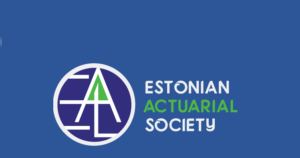About the Society
Statutory objectives of the Estonian Actuarial Society (EAS) are the promotion of actuarial profession and science, protection of rights of EAS members, development of contacts with other national and international actuarial organizations, participation in respective legislation of our field. In order to achieve these objectives, the EAS has adopted several important program documents, including the program of actuarial education, the code of ethics and disciplinary process.
Increasing education levels of its members is the most important objectives of the EAS. Most of our members have graduated from the University of Tartu, the faculty of mathematics. Most of our long-time members started their specialized professional studies at Actuarial Diploma Course and Advanced Actuarial Diploma Course, organized with the help of Institute of Actuaries and Faculty of Actuaries in Vilnius. Our newer members have mostly progressed through the master’s program of financial and actuarial mathematics of Tartu University. Supplementary education opportunities have been made available through summer schools of many other actuarial organizations (e.g. Poland, Italy, Switzerland, Latvia, Lithuania), different courses at foreign universities (e.g. Salzburg University) and the European Actuarial Academy. As an alternative, the EAS itself has invited guest lecturers from abroad to come and teach in Estonia.
One of the objectives of the EAS has been to achieve international recognition as a high-level professional organization. The EAS is a full member of International Actuarial Association (IAA) and AAE (Actuarial Association of Europe) – the organization which unites actuarial societies in Europe. Full membership status in these organizations first and foremost indicates that our members are considered equal partners at international level and our organization meets the highest international standards.
Communication outside professional line is also important for us. Annual festive year-end dinners and summer events in different places of Estonia (in Pärnu, Rõuge, Peedu, Kihnu, Nõva, Viljandimaa, Sangaste ja Naissaar) have become traditions.

